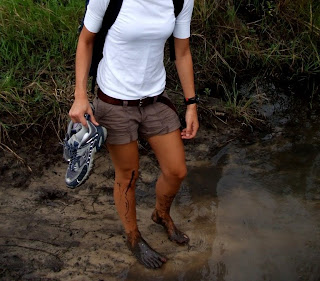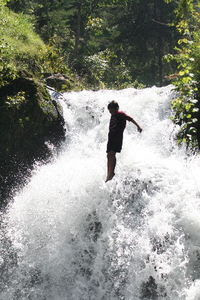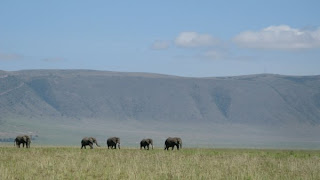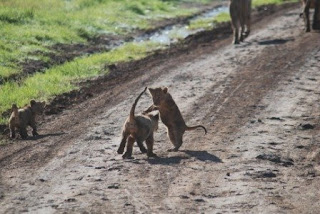
You’d think all you need is two bare feet to slip and slide down the muddy trail to the local cafe, plug the internet meter, and send word back home to family and friends that all is WELL! If only it were that easy! Here I am, Déjà vu, repeating the same activity as yesterday. It is half an hours (beautiful) walk to the internet café and when I get here I get busy downloading pics (30min for 10 pics) typing my message (45min), editing and spellchecking (10min)(does this sound like a MasterCard commercial?) CRAP! down goes the power - frickin priceless - and I loose everything. I pondered for a while thinking back to the days of my 24/7 wireless super fast internet connection that costs the same as a few beers for a month. I am dealing with a time rich but cash poor society whereas I am from a world that is totally opposite. I’ve gotten used to this common occurrence because electricity here is so unreliable. Nothing here is done in a hurry.....welcome to Africa!!! Oh well, the cup of tea and mango pie was scrumptious! Try again tomorrow and here I am.
I'll begin by telling you how just now, when I logged into my email account, I was shocked to see how many emails I had. I wish I could take the time to respond back to everyone. THANK YOU for following along with my journey, reading my blog, and spreading my plea. Your generosity will have a huge impact on the quality of life and life expectancy for people who live so contently in adverse conditions. I have elephant tears and a chimpanzee smile. Thank you! Grazie! Avante!
Survival is always a very persuasive motivation for learning, after my first week, it was apparent, I either learn to talk the talk or I'd continue to be targeted as a tourist. Swahili is actually very easy to learn, unlike English, every letter in every word is always pronounced and never made silent. Also, there are no words to denote "he" or "she", and the repetitive nature of many words makes it easier to remember. I'm now well beyond (truth-slightly beyond) the elementary level of the language and hold my own conversing. Being able to use a few Swahili phrases is important because the minute you blurt out even the most basic sentence, it is assumed you live in country. If you are a local and not a wageni (a visitor), you are thought to be wiser in the way things are done. A tourist knows nothing and is, therefore, a perfect pigeon. After all, strangers in a strange land, this happens to tourists all over the world, Africa is no different, foreigner unfortunately often translates into sucker.
The big cloud for me this week was finding out that a little girl of a family I’ve gotten very close with was punished because she didn’t have a school book she was suppose to have. Mwajuma had gotten the ruler smack and was kicked out of school for not having notebooks. Her family couldn't afford to buy the book. I could have just given her the dollar for the notebooks but I had a little righteous anger that needed to get out. I went to talk to the principal about her educational philosophy. I needed to ask her how she thought a ruler smack would help a child from a ‘headmistress’ who is a stern, unsympathetic soul. She had no answer for me but she said she’d put Mwajuma on the list of especially needy children (the no- beat list?) and that God would bless me. I wondered why she said that or if she would keep her word. Inhumane practices are the hardest thing to come to grips with here. I have come home to the volunteer house in shock when learning of things that should never be tolerated. Sadly, there are worse things I've been exposed to. It's very hard and I don't do well accepting them.
Tanzania has made great strides towards providing free education for all of the country's primary school children - one of the UN's Millennium Development Goals. The schools, such that they are, are more often than not a cement block building, without running water or electricity with a few rooms, serving 30, 40, or more children of probably a five year age span in each class. The more rural areas are lucky to have a one room, cement block building for all the children. School lunches? Well trained or well paid teachers? Books? Blackboards? Pencils? Paper? Those are luxuries. Families are responsible for covering the cost of uniforms, books, and supplies. Discipline is stricter than in the US. Although "caning" or corporal punishment is legally forbidden, it occurs frequently. Regulation uniforms and shoes are required of each student through secondary school. Children are taught to respect and obey their elders without argument, and their emotional needs or preferences are not a focus in the way that we tend to focus on these in the US. Enough of that.
Best thing of the week: we found an amazing coffee shop... smartly named "The Coffee Shop" where we purchase cake and on Saturdays- waffles with ice cream!!
Yesterday, I went to help a friend, who got involved on another volunteer project for a tree nursery (kind of accidentally - I may have volunteered him). We had to fill 800 bags with mud to plant all of the seeds. It’s rather messy but loads of fun. By the time we got done we were covered head to toe in mud, I’m sure the mud spewing fight didn’t help.

After numerous attempts to ask the locals for the spot where we could swim, as luck would have it we came across a friendly local Chagga guy, Freddy who decided it was not only his duty to show us where it was, but show us how to properly jump off the top as well. Fair enough. The trip long and hot as it was, totally worth it when I saw it. I momentarily had visions of ripping up my passport, marrying Freddy - local guide, Swahili translator and Chagga brewer of beer - spending the rest of my days jumping off waterfalls and indulging in Tarzan-like swinging off tree vines. After a few crazy jumpers - I wished I had the proper boardies on... fisherman pants was not fly at that height, we headed down the safer route; steep as shit but totally fun. I have no idea how long we spent jumping, swimming, splashing, and sunning watching the local lads show off for our benefit by climbing back up the waterfall bouncing over the rocks with nothing short of easy grace, only to jump the top again. I would have been more than happy to stay a few days... but no mosquito net and the nearest hotel is a fair distance. Yeah, I'm still in my western mentality.
Freddy's famous jump point

Garret with great form - Marangu Falls

Me throwing caution to the wind - "Bon sai!"

Crazy locals shimming up the falls

Had a quick English lesson with Freddy and his chums who vowed they would never charge us for use of their waterfall in exchange for English classes every few weeks. I agreed. You would be mad not to. When we got back to town some of Freddy’s buddies waved at us to stop at what I know now to be the local pub. If only I had known... We were cheerfully invited to try some local 'banana beer'. No worries, all of us fairly keen beer drinkers, we were quite happy to try it out, freshly brewed. Holy shit, never again. Lethal brew that was. It was a tasty(!) mixture resembling a mix of Kilkenny and Guiness - black n tan right? - full of warm pulp. Banana beer - nothing like anything I've ever tasted! Certainly didn't take long to chill the four of us out.
Floating in Marangu

Marangu - The word "Marangu" means a place with too many water streams. It is one of the most popular places in Tanzania. One of the proverbs of Chagga is "Ulamine kilahu ulyemkiwoa" which means do not despise something/somebody from which you once received support. Sounded good to me. Another proverb to add to my long list. They also say don't swim in the water, don't go barefoot, and for God sakes don't drink homemade beer....paaa-sha!!!
The somewhat famous village of Marangu sits on the far eastern side of Mt. Kilimanjaro and is the starting point for climbing the easy route, Marangu - also known as the Coca Cola Route. Unlike the other bigger cities of Moshi and Arusha, Marangu has a distinct feel - much more like a small mountain town. It’s lush, green, cool, loaded with banana trees - and is downright beautiful in many parts. The city center village isn’t much to write home about, but the area around it is filled with waterfalls, farms, nice hotels. You see women dressed in traditional outfits walking with huge stalks of bananas on their heads. Marangu is also a welcome relief from the punishing sun, as it sits high up on the side of the mountain, already between 4000ft to 5000 ft. It’s nice and cool at night.
So all this makes Marangu sound like a great place to visit, right? Well sort of. I really love the area itself, the problem is, I really don’t like the people. You see, Marangu has been the forefront of tourism on Mt. Kilimanjaro for countless years and many people have become successful because of tourism. Thousands and thousands of rich foreigners pass through this village every year - and have kind of set expectations and tainted the people, giving out money, candy, gifts, sponsoring students, and leaving their mark on this once quiet village.
Now the people, the children, the officials in Marangu know tourists, like you, have money and will give it away in some form. I feel like tourists are only seen as a outlet - as a way to make money - They will ask for your address or email address, so you receive a email a couple months later asking for money for school fees - or for some other random problem. This drives me crazy. It makes for a good conversation over who's exploiting who, and all my new friends are well aware I love a good debate. That said, you can have a great visit to Marangu. It’s a beautiful place - but if you are looking for something truly authentic, go somewhere else. There are hundreds of villages on mountain Kilimanjaro that never see a single tourist. The trick is, you need to find them. And I have!
I mentioned how we (my roommates) had all identified quirks about one another; Sondra is the most anal, the clean freak, organizing everything, always worried about time, Kate the most laid back, nocturnal, couldn’t care less if she ever showered, we let her know when it’s time! She’s also a great story teller. Me, most curious, peacekeeper, and exterminator extraordinaire when it comes to bugs or rodents, everything except for snakes. (Scottie, you’d be proud of your Aunt Ali). We all take turns fixing meals, it’s become a competition to see who can come up with the tastiest entrée. We’re extremely open to experimenting with new spices, so everything we eat is loaded with flavor, SPICY SPICY! Something I normally wouldn’t share, but it's so common here we all joke about it. Transitioning to a different diet can bring symptoms of well, Sondra put it best; "A few days of vicious dose of the runs and my sphincter felt like a cat flap in the Aswan Dam". Occasionally we'll struggle with a bout of diarrhea, and though it’s no laughing matter here since it’s the largest killer of children in the Sub Sahara, so far for us, it’s just been a symptom of using too much spice or a mild case of food poisoning. We’ve been fortunate to not have any severe illness. If I took a urine test I'm sure they'd detect DEET in my system, but I suppose it's better than the alternative.
If you were to ask a Tanzanian man what he enjoys eating, he would reply, "Beef." I'm told meat is not widely consumed here in comparison with other areas of the continent, but that is definitely not true in the tourist towns, they cater meat to people with money. In rural communities, cattle are normally slaughtered only for very special occasions, such as a wedding or the birth of a baby. Cattle, sheep, and goats are raised primarily for their milk and the value they contribute to social status. Nyama choma is Swahili for "grilled meat." But it can be either nyama n’gombe, grilled beef, or nyama kuku, grilled chicken. Beef nyama choma is just a slab of beef—any slab will do—that is slow cooked over a fire for about 45 minutes. They cook the meat until it is way past well done. I mean that meat is seriously cooked! Once done, the meat is either sliced into bite sized morsels and served in a bowl with a side of ugali and grilled bananas, or everyone grabs their knife and slices off the meat as they desire.
The bananas are actually plantains, the starchy non-sweet cousin of the supermarket variety. They are peeled and thrown onto the fire along with the beef and go through the same agonizing torture.
Nyama choma can be a real treat, if you approach it with the right perspective. First of all, go to the dentist and have a real thorough check-up before eating nyama choma. Secondly, don’t try comparing it to anything you could get at "Mortons of Chicago". Instead, an ideal time to try it for the first time is after climbing Mt. Kilimanjaro, when you haven’t had fresh food for a week of camping in cold weather. After such an arduous trek, nothing else on earth will satisfy you in quite the same way. I laughed so hard when someone told me that, since I don't have that experience to judge by. There is something primeval about skewering a 4 pound slab of meat on a stick, cooking it on an open fire, and cutting it up with a Crocodile Dundee knife that satisfies you on some lower level.
Plenty to choose from here for beer. The most popular brand depends on where you are. In and around Arusha, Kilimanjaro Lager was the choice. Kilimanjaro was a very mild beer, similar to Heineken or Amstel. People seemed to drink a lot of Tusker (a Kenyan beer) in Zanzibar. But I didn’t care for it very much. It reminded me of Budweiser, but my motto, after the first two, who can tell.And then there's Freddy's homebrew banana beer, everyone should sample that at least once in their lifetime. The other choices: Kibo Gold, which tasted a lot like Kilimanjaro, and Serengeti Lager, which was malt liquor at 8% alcohol. A couple three bottles of that and I was toasted.
Routine has set in, when I first arrived I wrote how making coffee/tea in the mornings took too much time, well, I've reversed my position. Now I find that morning time to be enjoyable, even the activity itself. I wake up, climb out from under my mozzie armor, stumble to the kitchen door, step out and greet the barely awake day, light the gas burner and put the pot of water on. On mornings when it's not raining, I'll lay on our picnic table while the water is heating and just listen to the sounds. On the rainy mornings, I'll sit under the tin canopy and smile watching the down pour and be grateful for a supply of water. WATER!
Last weekend a group of 10 went to the biggest crater/ caldera in the world- Ngorongoro Crater! In a word; Stunning - this is where a Jurassic Park would be. (photos posted at the end) The park is in the middle of the crater, which is surrounded by the intact crater rim, circling 360 degrees around the mostly savannah floor. The ride into the crater is not for the faint of heart! First, you zig zag your way out or the Great Rift Valley, up the crater side with hair pin turns dropping down at dizzying heights to the valley below (of course there are no road side concrete barriers to stop you from sliding down to oblivion should a large transport truck pass you on the inside - just a foot or two of leeway and a pray). The road is a loose, red earthed bed of pot holes - thank goodness it wasn't raining. You reach the crater rim and then traverse along the crater highlands for miles, bumping along at breakneck speeds more suitable for the California highway. I have no idea how the jeeps stay bolted together. From here, you either carry on to the Serengeti, dropping down the exterior crater rim once again, or you descend into the crater on an equally impossible road. We were all clinging to the jeep hand holds, bouncing around like an amusement park ride. I kept imagining a Disney ride called 'African Safari' with a heart stopping roller coaster ride combined with a wild animal theme. When we got there I thought I was dreaming. There were tons of wildebeest and zebras. We even saw a newborn wildebeest whose mother still had the red birthing sack attached to her. There were loads of baby zebras as well. I of course took 100 of the same picture. We saw hyenas, elephants, antelopes, baboons, wildebeest, zebras, lions, black rhinos, hippos, flamingos, warthogs, and lots more! I must have took a good 800 pictures there. We even had lunch that day next to a lake full of hippos! Two nights we stayed in a tented camp run by Ahsante. It was a few miles off the main road, down a rutted country road past a collection of farmers huts and fields. Super cool! It’s the closest thing to living a fantasy I’ve ever experienced. I don’t think I can truly capture it in words.
Photos from Ngorogoro Crater

















Once more, I apologize for not answering each email individually. It’s really nice to get them, keeps me in the know, makes me feel connected. Thank you all!
Before I run out of minutes here, to my family:
LB: Think of me when you're at opening day!! Go Cubs!!
J: That hill I look at in the morning is teasing me. Wish you were here.
Merrit: Spring is in the African air here by the number of baby animals. I’ll miss helping plant your garden, I wish you could see all the things they grow here! Its awesome.
Mama: It’s the genes, what did you expect when you mix moxi with stubborn? I’m fine, please don't worry!
Dad: Can’t wait to see your new home. I haven't found a taildragger yet, could be the perfect opportunity for a business venture? Feel like coming to Africa?
all my love -a



